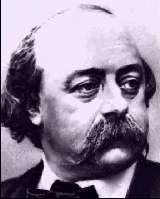
Born: December 12, 1821, in Rouen, France
Died: May 8, 1880, in Croisset, France
Gustave Flaubert was the second son of Achille Cléophas Flaubert, the chief surgeon at the Hôtel- Dieu in Rouen. His mother was the daughter of a wealthy doctor.
He began writing at a very early age and his first published work appeared when he was only sixteen. He was a solitary youth with a rich imagination that served him well in the creation of prose. Despite his young age, he tackled the complexities of love and inner strife which were presented in his Mémoires d'un fou; the expression of his infatuation with Elisa Schésinger.
In 1841, Flaubert entered the faculty of Law in Paris but was forced to withdraw from studies when he discovered that he was afflicted with epilepsy. He continued to write but none of his major works were published during this period. In 1846 his father died, and his sister died a year later as a result of complications during childbirth. Her child survived and Flaubert, his mother and the new child moved to Croisset.
At around this same time, Flaubert met and began an affair with Louise Colet. After nine years together, his stubborn independence and her jealous nature forced them to separate. During their time together, Flaubert traveled extensively throughout the Middle East and Greece with Maxime du Camp. The sights and impressions from these travels would later appear as the rich backdrops of his story Salammbô, published in 1862.
Perhaps his most famous work is Madame Bovary, his first major work to be published. The story details the romantically motivated, marital indiscretions and subsequent suicide of a wife in a French provincial town. The text, published by du Camp in installments, is a condemnation of what he sees as the petty, drab lives of the French Bourgeois class. His attention to detail, the development of psychological character profiles and disinterested narrative style distinguish this book from many others.
Flaubert was not a prolific writer and often took years to finish his books. His objective was to sculpt beautiful prose, with exact meaning rather than to produce large quantities of work. He died suddenly of a stroke and his final work, Bouvard and Pecuchet, was posthumously published unfinished.